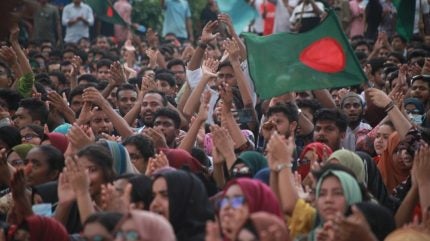
The wage protests, which took place outside 130 garment factories in key industrial areas such as Gazipur and Narayanganj, are reported by local news site BenarNews, to be the first significant labour action in the country’s garment sector since the new interim government took office last month.
The publication claimed factory owners had already suspended production at around 150 plants on Monday due to unrest, leading to a joint deployment of military and police forces.

Discover B2B Marketing That Performs
Combine business intelligence and editorial excellence to reach engaged professionals across 36 leading media platforms.
While the situation appeared to stabilise by Tuesday (3 September) afternoon, a new wave of disruption occurred when a group of people reportedly vandalised garment factory areas, prompting another round of factory closures.
The Bangladesh Garment Manufacturers and Exporters Association (BGMEA) did not respond to Just Style’s request for comment at the time of going to press, however the organisation told BenarNews “outsiders” were responsible for inciting the unrest.
He claimed the individuals gathered outside the factories demanding jobs and pressuring workers to join the protests.
“Some people are trying to get illegal benefits, creating such unrest. We already talked with the concerned authorities and they assured us that necessary steps would be taken in this regard,” he told the local news publication.

US Tariffs are shifting - will you react or anticipate?
Don’t let policy changes catch you off guard. Stay proactive with real-time data and expert analysis.
By GlobalDataLocal news publication Dhaka Tribune also reported the BGMEA maintained it is committed to addressing labour discontent, but added: “It’s important to note that those causing unrest are not RMG (readymade garment) workers.”
Local news reports suggest the protests have come at a challenging time for the interim government, which has struggled to maintain stability following the resignation and departure of former prime minister Sheikh Hasina on 5 August, amid student-led anti-government protests. The transitional administration is now facing increasing pressure to address workers’ demands while ensuring law and order.
Sarwar Hossain, president of the Bangladesh Garments Workers Union Federation, also raised concerns to the news site about the influence of outsiders on the protests.
“We the workers want to maintain the industrial production. We want to realise some demands of our workers in a systematic way, but now those who attacked the garment factories are not workers,” he told BenarNews.
One garment worker, Khokon Mia, from the Jamuna Denim factory in Gazipur, confirmed that the protests initially focused on demands for better pay and overdue wages. However, the situation escalated when outsiders joined the demonstrations, causing further disruption.
Hossain also suggested the unrest might be linked to disputes over control of the “jhute business,” a local term for garments rejected for export but highly sought after in the domestic market.
He speculated that politically connected groups might be attempting to exploit the current political uncertainty to gain control of this lucrative market.
Asif Mahmud Shojib Bhuiyan, an adviser to the labour and employment ministry, acknowledged that some worker grievances, such as unpaid wages were legitimate. However, he told reporters at BenarNews the government would not tolerate any attempts by outsiders to incite “chaos within the industry”.





